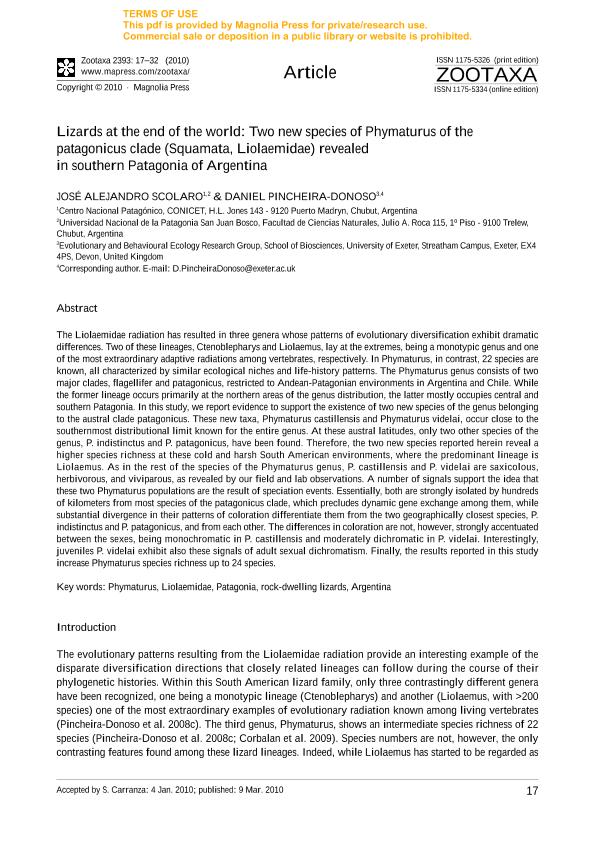Mostrar el registro sencillo del ítem
dc.contributor.author
Scolaro, Jose Alejandro

dc.contributor.author
Pincheira Donoso, Daniel
dc.date.available
2018-10-16T19:30:41Z
dc.date.issued
2010-01
dc.identifier.citation
Scolaro, Jose Alejandro; Pincheira Donoso, Daniel; Lizards at the end of the world: two new species of Phymaturus of the patagonicus clade (Squamata, Liolaemidae) revealed in southern Patagonia of Argentina; Magnolia Press; Zootaxa; 2393; 1-2010; 17-32
dc.identifier.issn
1175-5326
dc.identifier.uri
http://hdl.handle.net/11336/62469
dc.description.abstract
The Liolaemidae radiation has resulted in three genera whose patterns of evolutionary diversification exhibit dramatic differences. Two of these lineages, Ctenoblepharys and Liolaemus, lay at the extremes, being a monotypic genus and one of the most extraordinary adaptive radiations among vertebrates, respectively. In Phymaturus, in contrast, 22 species are known, all characterized by similar ecological niches and life-history patterns. The Phymaturus genus consists of two major clades, flagellifer and patagonicus, restricted to Andean-Patagonian environments in Argentina and Chile. While the former lineage occurs primarily at the northern areas of the genus distribution, the latter mostly occupies central and southern Patagonia. In this study, we report evidence to support the existence of two new species of the genus belonging to the austral clade patagonicus. These new taxa, Phymaturus castillensis and Phymaturus videlai, occur close to the southernmost distributional limit known for the entire genus. At these austral latitudes, only two other species of the genus, P. indistinctus and P. patagonicus, have been found. Therefore, the two new species reported herein reveal a higher species richness at these cold and harsh South American environments, where the predominant lineage is Liolaemus. As in the rest of the species of the Phymaturus genus, P. castillensis and P. videlai are saxicolous, herbivorous, and viviparous, as revealed by our field and lab observations. A number of signals support the idea that these two Phymaturus populations are the result of speciation events. Essentially, both are strongly isolated by hundreds of kilometers from most species of the patagonicus clade, which precludes dynamic gene exchange among them, while substantial divergence in their patterns of coloration differentiate them from the two geographically closest species, P. indistinctus and P. patagonicus, and from each other. The differences in coloration are not, however, strongly accentuated between the sexes, being monochromatic in P. castillensis and moderately dichromatic in P. videlai. Interestingly, juveniles P. videlai exhibit also these signals of adult sexual dichromatism. Finally, the results reported in this study increase Phymaturus species richness up to 24 species.
dc.format
application/pdf
dc.language.iso
eng
dc.publisher
Magnolia Press
dc.rights
info:eu-repo/semantics/openAccess
dc.rights.uri
https://creativecommons.org/licenses/by-nc-sa/2.5/ar/
dc.subject
Phymaturus
dc.subject
Liolaemidae
dc.subject
Patagonia
dc.subject
Rock-Dwelling Lizards
dc.subject
Argentina
dc.subject.classification
Otras Ciencias Biológicas

dc.subject.classification
Ciencias Biológicas

dc.subject.classification
CIENCIAS NATURALES Y EXACTAS

dc.title
Lizards at the end of the world: two new species of Phymaturus of the patagonicus clade (Squamata, Liolaemidae) revealed in southern Patagonia of Argentina
dc.type
info:eu-repo/semantics/article
dc.type
info:ar-repo/semantics/artículo
dc.type
info:eu-repo/semantics/publishedVersion
dc.date.updated
2018-10-12T18:04:25Z
dc.identifier.eissn
1175-5334
dc.journal.number
2393
dc.journal.pagination
17-32
dc.journal.pais
Nueva Zelanda

dc.journal.ciudad
Aukcland
dc.description.fil
Fil: Scolaro, Jose Alejandro. Consejo Nacional de Investigaciones Científicas y Técnicas. Centro Nacional Patagónico; Argentina. Universidad Nacional de la Patagonia ; Argentina
dc.description.fil
Fil: Pincheira Donoso, Daniel. University of Exeter; Reino Unido
dc.journal.title
Zootaxa

dc.relation.alternativeid
info:eu-repo/semantics/altIdentifier/url/http://www.mapress.com/j/zt/article/view/7885
Archivos asociados
